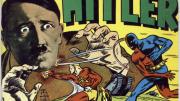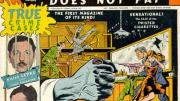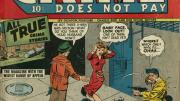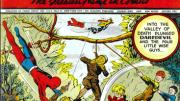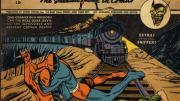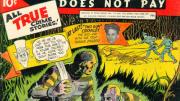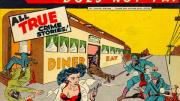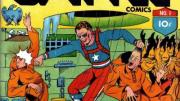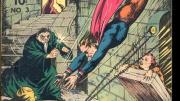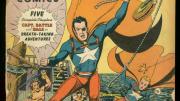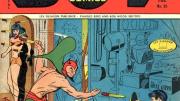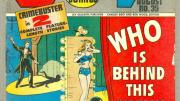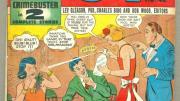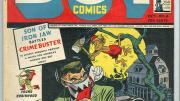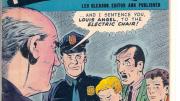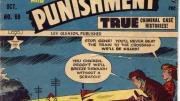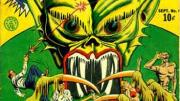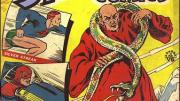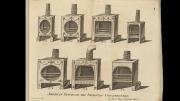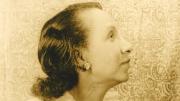July 1941. In his bunker, the Führer and his henchmen finalize schemes for world domination. Hitler peers into a crystal ball. “Blitzkrieg!” he proclaims. London is about to be leveled.
Hope is lost. But wait—who is that, crouching on the other side of the wall? It’s Daredevil, infiltrating the Nazis’ inner sanctum to learn their plans. “I’ve a message for the Fuehrer!” he cries, bursting through the door and landing his first punch. Then, leaving Hitler and his cronies to nurse their wounds, the superhero flies off to warn Churchill. All in a day’s work.
Daredevil Battles Hitler, a bold call for U.S. intervention in Europe, was a rare comic book with an overtly political message. The man responsible was Leverett Stone Gleason ’20, a Harvard dropout and one of this country’s first, and most controversial, comic-book publishers. Most of his peers were hardscrabble New Yorkers, many of them Jewish; he had grown up in a comfortable Protestant home near Boston, attending Andover before entering Harvard. When the United States declared war on Germany in 1917, he dropped out to fight in France; when he came home, he tried magazine sales before taking a job in New York with Eastern Color Printing, where the modern comic book was born.
Gleason saw money in comics, and in 1939 started his own firm, releasing Daredevil and then Crime Does Not Pay, which chronicled the real-life adventures of convicted criminals. Crime Does Not Pay was soon beating out Captain Marvel and Superman, attracting readers wary of the aw-shucks wholesomeness of men in tights.
Daredevil Battles Hitler reflected Gleason’s politics. Arriving in New York in the depths of the Depression, he was stunned by the Hoovervilles in Central Park. And he became convinced that his country had an obligation to stem the rise of fascism. New Deal support for New York’s artists created a powerful anti-fascist movement that Gleason relished. He published screeds like Sabotage: The Secret War Against America, about domestic fascism, and The Incredible Tito! Man of the Hour. His business approach reflected his convictions. Although comics artists generally were paid poorly and had little control over their content, Gleason established a profit-sharing arrangement with his editorial team, giving them partnership status and substantial autonomy.
After Pearl Harbor, Gleason re-enlisted, serving stateside for two years. But postwar, as fears of domestic subversion grew, his activism and his business came under fire. By December 1945, the New York World-Telegram had labeled him a “pro-Communist fellow-traveler.” The House Un-American Activities Committee named a group he supported, formed to aid Spanish Civil War refugees, a “communist-front organization.” For refusing to name names, Gleason and fellow board members were convicted of contempt of Congress in 1947. In 1950, he felt the need to declare “I am not a Communist” in his own publications. “We are in a period of a reactionary swing in this country…which holds many of the elements of potential fascism,” he wrote. “There must be no denial of civil liberties to anyone….Any drive against the rights of one is a threat to the rights of all.” Opponents responded with voting records showing that he had registered as a Communist in the 1930s.
Meanwhile a boom in comics’ popularity—and a perceived spike in juvenile delinquency—had raised concerns about their effect on children. Gleason, as president of the Association of Comics Magazines Publishers, came to the defense of the industry. In the New York Times, he decried “the insidious effort in some quarters to set up an intellectual dictatorship over the reading habits of the American people….Millions of American adults prefer [Westerns], for example, to the finest production of Macbeth. This is their privilege.” Gleason asserted that many comics readers were adults, and in Today’s Health stated, “Comics…can actually help mold their young readers into happier, more intelligent adults.” Then came the rise of horror comics and publication of psychiatrist Fredric Wertham’s 1954 bestseller, Seduction of the Innocent. At U.S. Senate hearings on comics that year, Wertham was the star witness, and the only publisher called to testify was William Gaines of Entertaining Comics, purveyor of titles like Tales from the Crypt, Vault of Horror, and Haunt of Fears. Gleason pleaded in vain for a chance to testify and tore into Wertham as a “Freudian fanatic…creating utterly false fears among parents.” Although he persuaded his fellow publishers not to ban the word “crime” from comics outright, the industry’s revised self-censorship code accepted Wertham’s view that comics were strictly for kids. It outlawed stories detailing criminal planning, dooming Crime Does Not Pay. By late 1955, the offices of Lev Gleason Publications were closed.
So abrupt was his departure, some speculated he’d fled to Alaska or Cuba. In fact, he became a small-time real-estate agent, selling patriotic ornaments to make ends meet. He remained an activist. “My greatest satisfactions have been doing what I can politically to make ours a better country and the world a little more peaceful,” he wrote in his fiftieth-reunion report. “I have been strongly opposed to the Vietnam War since the outset. And I do hope for better things. Probably because of the efforts of today’s youth, especially the militant ones, who have more guts than we had."

